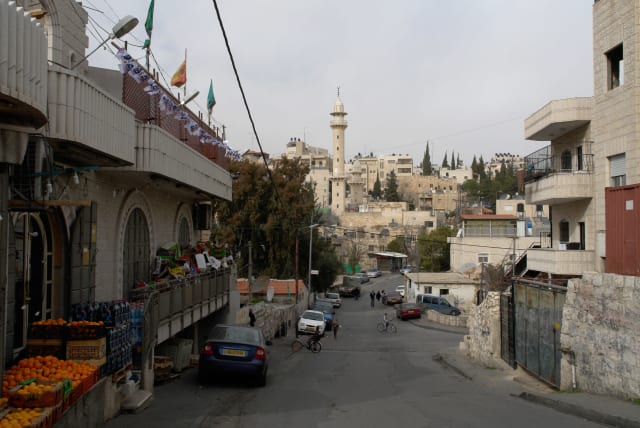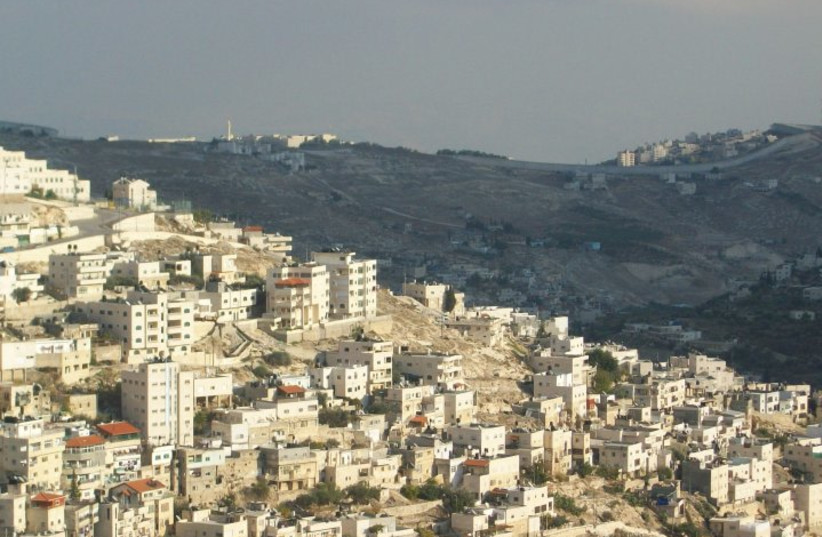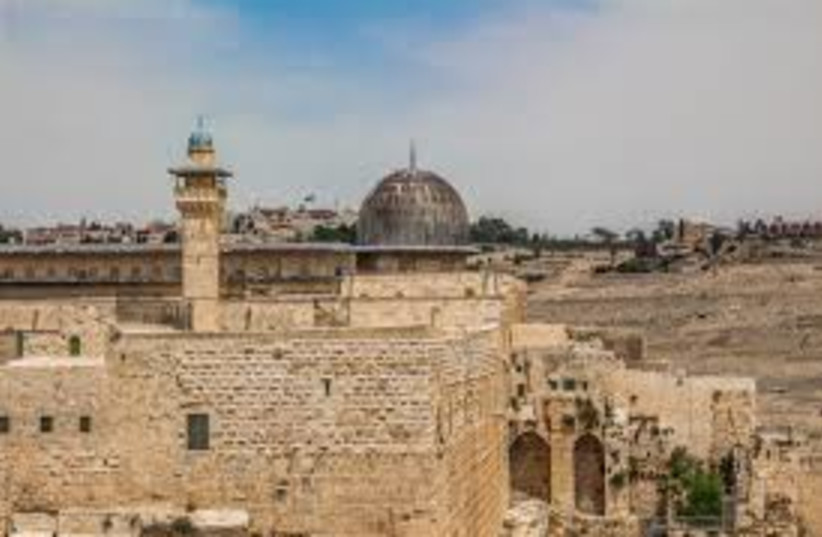More Palestinians than ever want Israeli sovereignty in Jerusalem - poll

A Palestinian poll indicates shifts in the attitudes of east Jerusalemites toward Israel over the last decade.
More Palestinians are supporting Israeli sovereignty in Jerusalem, according to a poll conducted by the Palestinian Center for Policy and Survey Research (PSR) in November which was published last month.
The poll examined the shifts in Palestinian attitudes since 2010 when a similar poll was conducted.
Respondents were asked various questions regarding their thoughts about living in Jerusalem. The results for each question are compared side by side with the 2010 results.
Goals of the survey
The survey identified two goals it sought to achieve. First, it wanted to "identify current problems and concerns of East Jerusalem Palestinians under existing political and living conditions [as well as] identify their views and likely patterns of behavior in a future political settlement." Secondly, the survey wanted to compare the results with the previous 2010 poll in order to find elements of change.
Survey respondents were asked about the delivery of specific services provided by the Israeli Jerusalem city municipality.
In the vast majority of cases, Palestinians are more satisfied with the services provided to them than they were ten years ago. While many of the increases in satisfaction are modest, others are dramatic. For instance, satisfaction with "the speed with which ambulance services arrive at the scene after requesting it" rose from 46% to 69%.
Palestinians expressed similar increases in their rate of satisfaction with things such as "the speed with which fire and other emergency services arrive at the scene" (42% to 70%), "overall standard of living" (35% to 56%) and "access to areas inside the West Bank" (27% to 48%). Even person-to-person interactions between Israeli officials and Palestinians seem to have improved with an increase of 21% to 36% in reported satisfaction.
Areas in which satisfaction decreased were fewer and comparatively insignificant. For instance, satisfaction with access to their jobs decreased from 40% in 2010 to 35% in 2022. The most dramatic decrease in satisfaction was in satisfaction with the supply of electricity to the participants' neighborhoods; a figure which fell from 85% to 75% over that time.
Generally, the period from 2010 to 2022 saw increases in the satisfaction of east Jerusalemites with the services they were provided by the Israeli municipality in 21 different categories. In contrast, satisfaction only decreased in four categories.
Residents of east Jerusalem were also asked if they thought the Jerusalem municipality discriminated between Jews and Arabs. While in both years the poll was conducted the vast majority of respondents answered in the affirmative, the proportion of those who did not think there was discrimination rose significantly.
While only seven percent of respondents in 2010 said there was no discrimination, 13% said gave the same answer in 2022. Additionally, the proportion of those who responded with "don't know or not applicable" rose from 6% to 9% over that time.
Additionally, the poll reflects that over the 12-year gap between pollings, a significant proportion of Palestinians started relying on family and offices of the Israeli government when they have a problem or need social assistance. The figure rose from 44% and 31% respectively to 51% and 40% respectively.
The poll also compared the 2010 and 2022 responses regarding whether east Jerusalem Palestinians viewed various issues as problems. Respondents were presented with nine issues and asked if the issue was a "problem," "not a problem at all" or if the issue was not applicable/they "[didn't] know."
Regarding "the level of corruption from Palestinian Authority officials," "the level of corruption from Israeli Jerusalem municipal officials," "the level of crime," "the level of delays and restrictions at checkpoints" and "the level of delays and restrictions created by the building of the wall in Jerusalem," proportions of people who responded that it was a "problem" decreased.
It should be noted that the proportion of Palestinians who responded that "corruption with Israeli Jerusalem municipal officials" was a problem fell dramatically from 78% to 66%. In comparison, the proportion of Palestinians who responded that "corruption in the Palestinian Authority" was a problem only dropped from 69% to 66%.
Who do east Jerusalemites prefer in charge?
The PSR poll also presented respondents with the prompt, "When Palestinians and Israelis return to negotiations, the issue of the sovereignty over east Jerusalem will be discussed." It then asked, "what do you prefer? Palestinian, Israeli or international sovereignty?"
The responses between the two polls again, radically shifted. Between 2010 and 2022, the percentage of respondents who preferred Palestinian sovereignty dropped from 52% to 38%. Meanwhile, the percentage of those polled who preferred Israeli sovereignty rose from 6% to 19%. The percentage of those who responded saying they preferred international sovereignty or "other" remained more or less the same.
This trend of seemingly warming attitudes toward acceptance of the State of Israel continued. Asked, "if a permanent two-state solution is arrived at, would you prefer to become a citizen of Palestine or would you prefer to become a citizen of Israel?" those who preferred Israeli citizenship rose from 24% to 37% between 2010 and 2022. Simultaneously, those who preferred Palestinian citizenship dropped from 63% to 58%.
Still, if circumstances played out in a manner where the neighborhoods of the respondents became an official part of a Palestinian state or a part of Israel under an internationally recognized agreement, most would prefer to stay in their homes rather than move to the other state.
Various areas of concern expressed about the future
East Jerusalemites were also asked about four areas of concern that they may have should their neighborhood become part of Israel and they become Israeli citizens. Between 2010 and 2022 those who said they would be concerned that they would face possible discrimination because they are Arab dropped from 82% to 64%.
Those who said they would be concerned about their access to Jerusalem's Old City and the al Aqsa Mosque dropped from 72% to 41%.
Those who said they would be concerned about losing freedom of movement inside a Palestinian state dropped from 67% to 43%.
Finally, those who said they would be concerned about losing access to adequate education for their children dropped from 58% to 36%.
Respondents were also asked about areas of concern that they may have should their neighborhood become part of a Palestinian state and they become Palestinian citizens. In the vast majority of these areas, concerns grew between 2010 and 2022.
For instance, respondents expressed worry about their ability to write and speak freely, having to change from the Israeli healthcare system to a Palestinian healthcare system, reduced law enforcement, and losing Israeli retirement and unemployment benefits.
While the PSR poll may reflect a degree of warming sentiments among east Jerusalemites toward Israel, the majority still have strong concerns and reservations about the State of Israel and the Jerusalem City Municipality as it pertains to their lives in Jerusalem.
Still, the poll seems to highlight that it is possible, through Israeli action, to bolster ties and develop a reality of acceptance and coexistence between Israelis and Palestinians in Jerusalem.
Jerusalem Post Store
`; document.getElementById("linkPremium").innerHTML = cont; var divWithLink = document.getElementById("premium-link"); if (divWithLink !== null && divWithLink !== 'undefined') { divWithLink.style.border = "solid 1px #cb0f3e"; divWithLink.style.textAlign = "center"; divWithLink.style.marginBottom = "15px"; divWithLink.style.marginTop = "15px"; divWithLink.style.width = "100%"; divWithLink.style.backgroundColor = "#122952"; divWithLink.style.color = "#ffffff"; divWithLink.style.lineHeight = "1.5"; } } (function (v, i) { });


